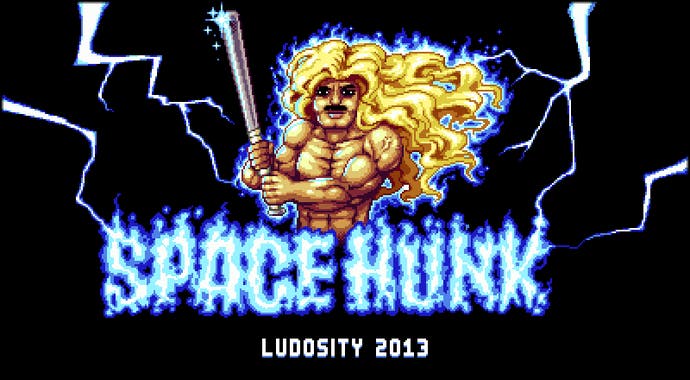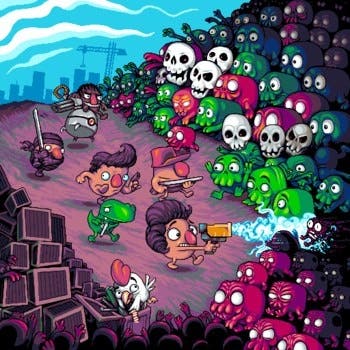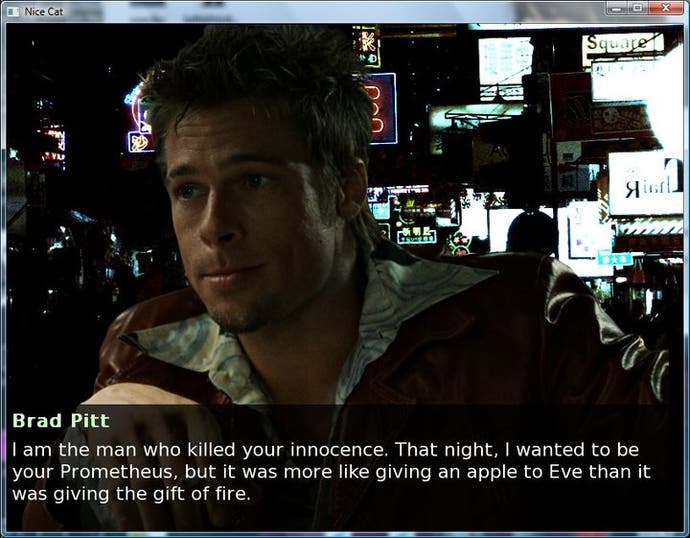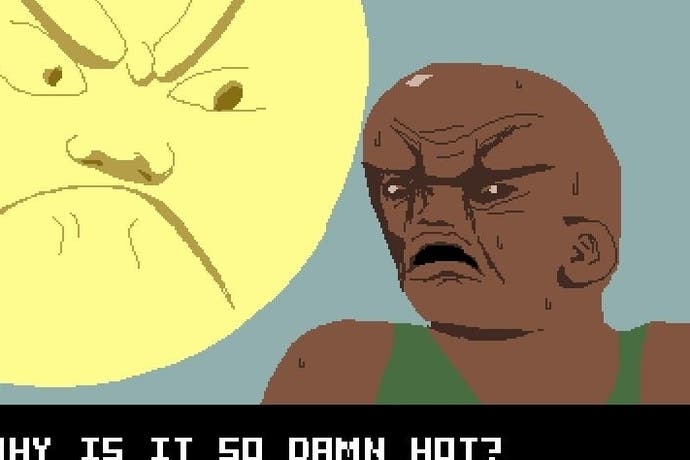Inside the Poppenkast, indie's secret idyll
It's helped spawn Hotline Miami and Lone Surivor - welcome to indie gaming's most powerful forum.
"The Poppenkast is basically a community of people who are doing some kind of games related stuff." Jan Willem Nijman, one half of Vlambeer, pauses, taking a breath as if he's going to continue his sentence, before letting it stand as it is. For the past five minutes he's been trying to explain what the Poppenkast is in a single sentence, and for the past five minutes he's been struggling.
In short, the Poppenkast is an online forum. Which would be no special thing, except the people who are members and the things that they do there make it one of the most exciting places for discussion if you're an independent developer. People put up work in progress games, share thoughts, ideas, concepts, criticisms; basically everything you could get on TIGSource, except in private. Which is no small caveat.
"It's really hard to talk about it as one thing, because it's so many awesome people, and some don't even release anything, they just make awesome stuff." Awesome people like Messhof, Cactus, Jasper Byrne and Paul Veer, and awesome stuff like Nidhogg, Hotline Miami, Lone Survivor and The Random Encounter. The list of Poppenkast members reads like a Who's Who of the independent development scene at the moment, an exclusive club of indie virtuosos throwing out ideas and sharing thoughts on one another's games. It sounds a bit like an indie utopia, somewhere for young hopefuls to set their sights on.
Except you can't just sign up and create an account. "You can't really join the Poppenkast." Nijman continues. "You have to be nominated by old members. And that nomination usually happens without the nominee knowing about it. It's kind of a mess, but it works."
""You can't really join the Poppenkast." Nijman continues. "You have to be nominated by old members. And that nomination usually happens without the nominee knowing about it. It's kind of a mess, but it works."

"It started with a couple of people from the Gamemaker Pixel forums, which was a thing in 2004, who wanted a more private place to talk about games. And for some reason it's survived and become the Poppenkast. It's not really a collective or anything; just a weird combination of people, who only really have their approach to games in common. It's about the art side and the design, but not the business. It's all about what comes out of the creation of games."
And it's here that the Poppenkast starts to get interesting. Instead of just being a place for interesting game developers to share ideas and discuss one another's work, the Poppenkast is also host to its own unique flavour of game jams.
"The Poppenkast was one of the first places to do really short game jams, one or two or three hours." Which is frankly an insanely short amount of time. Where Ludum Dare's 48 seems a little on the short side, three hours to make a game sounds impossible. When I put that exact sentiment to Nijman he just shrugs.
"Super Crate Box started in three hours; it had maybe three different weapons but the basics were there. Same thing with Luftrausers." That'd be Vlambeer's first and latest games, respectively. It's a culture of creation where conveying an idea in as short amount of time as possible is the most important thing.
Jonatan Soderstrom, better known as Cactus, also views these 'flash' game jams as a useful tool. "I entered a couple of them and they've been a great way to get small ideas out of your head. It's also inspiring to see other people churn out good games in a very limited amount of time." And up until his latest release, Hotline Miami, almost all of Cactus' games fitted the bill of something highly specialised and completely short-form.
"I think the Poppenkast was the first time I saw really talented pixel artists and ambitious game designers. The first game I made after joining was Illegal Communication if I remember correctly." Illegal Communication was somewhere between an adventure game and a puzzler, all neon green on black. "It was a big step up from my previous games, and was a direct result of being influenced by the Poppenkast members. They helped out a lot with testing and advice, which was great. From there on, I've used Poppenkast as a place where I can get feedback on my projects without releasing them to the public eye."

That last sentiment was repeated over and over again from everyone I talked to about the Poppenkast. The value in having somewhere to try out new ideas that isn't in any way compromised by the public or even people you don't really know, and knowing you're going to get constructive criticism on a game from the very first stages of development is an invaluable resource.
"Every Vlambeer game has been up on the Poppenkast super early." Nijman tells me. "It's a really great place to post work in progress projects. The kind of things in games you can't really show to people without ruining them. And I've always been making loads of games and I've posted them all there and received a lot of feedback and really good harsh criticism."
By having the community private and somewhat exclusive, there's no fear that you're putting something out too early, or people might not understand what you're trying to do. But having feedback at that stage can avoid a problem you might not have seen until it was too late. It's the reason big AAA development teams have massive QA departments that start testing prototypes from the get go. But indies don't have that kind of money, and have to rely on communities instead.
"A lot of the Poppenkast are listed in the credits." Jasper Byrne joined the Poppenkast during the development of his first game, Lone Survivor, a 2D horror game that managed to hold a candle to Amnesia's terrifyingly mutilated scares. "They really contributed a huge deal, mostly on getting things to feel right, but also via the various inspiration threads there. A lot of the guys on there have a real knack for 'feel' having grown up playing and admiring classic 2D games."
And this was the other sentiment that I heard echoed across all three developers; it's not entirely about the games. Having a group of passionate developers all in one space means that they're going to share interests, from books to music to art, and that culture cross-pollination serves as inspiration.
"It's people talking about interesting stuff on top of a giant trash heap. A lot of times in the game industry it's awfully serious, where you only talk about games."

"We all share things we find interesting" Cactus elaborates. "and a lot of odd things have popped up there that have been inspiring to some degree. It's very nice to have a collective that shares obscure material with each other, making it a lot less hard to find things that keep you motivated."
Nijman puts it a little more colourfully: "It's people talking about interesting stuff on top of a giant trash heap. A lot of times in the game industry it's awfully serious, where you only talk about games. But with the Poppenkast we can talk about a really interesting movie that we've seen, or music we like. Because that's a really important part of creativity, having other sources of inspiration. If you go to GDC no one is going to be talking about books or music."
One of the costs of independence is solitude. Even if you're in a team, you're working among a very small group of people, and there's not that community culture that you often find with a big development team. There's no conceptual support structure for the independent developer, not naturally. And that's the role that the Poppenkast fills, at least from the way that Nijman, Cactus and Jasper Byrne talk about it. Somewhere to share ideas, and have them commented on. Somewhere to complain about the state of the industry, and discuss the ways it's excellent.
The first thing I thought when I found out about the Poppenkast was that it was a finishing school for independent game makers, somewhere for them to refine their craft and become the developers that we see today, people like Cactus, Messhof, Vlambeer. And as much as that is true, what's interesting is that there are just as many members who haven't quite made it that far, and are still churning out brilliant and weird games that hardly anyone sees.
There's Super Banana Nababa, a game supposedly made by all of the Poppenkast, but hasn't really made it very far off the ground. Connor Kimbrough, better known as Professor Dead, who's put out a huge number of experimental titles, none of them commercial. They're all supported by the same community that doesn't care about how many zeroes are popping up in your bank account each month, but instead just whether your ideas are interesting or not. It's all a little artistic utopia, a walled garden that benefits from its privacy, and somewhere that's more than a little beautiful.









